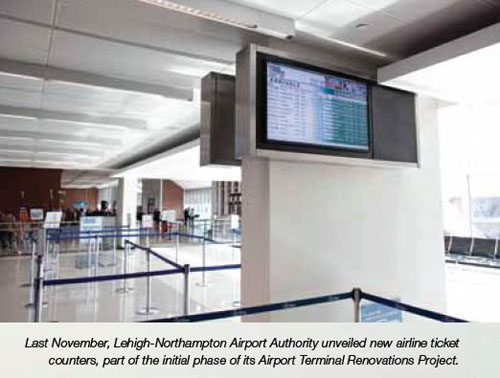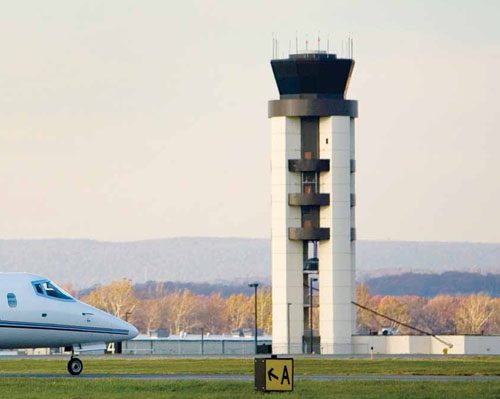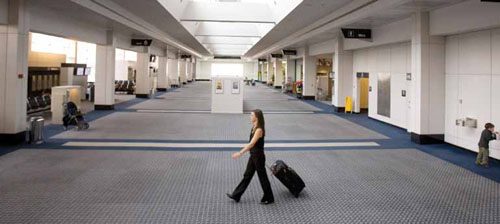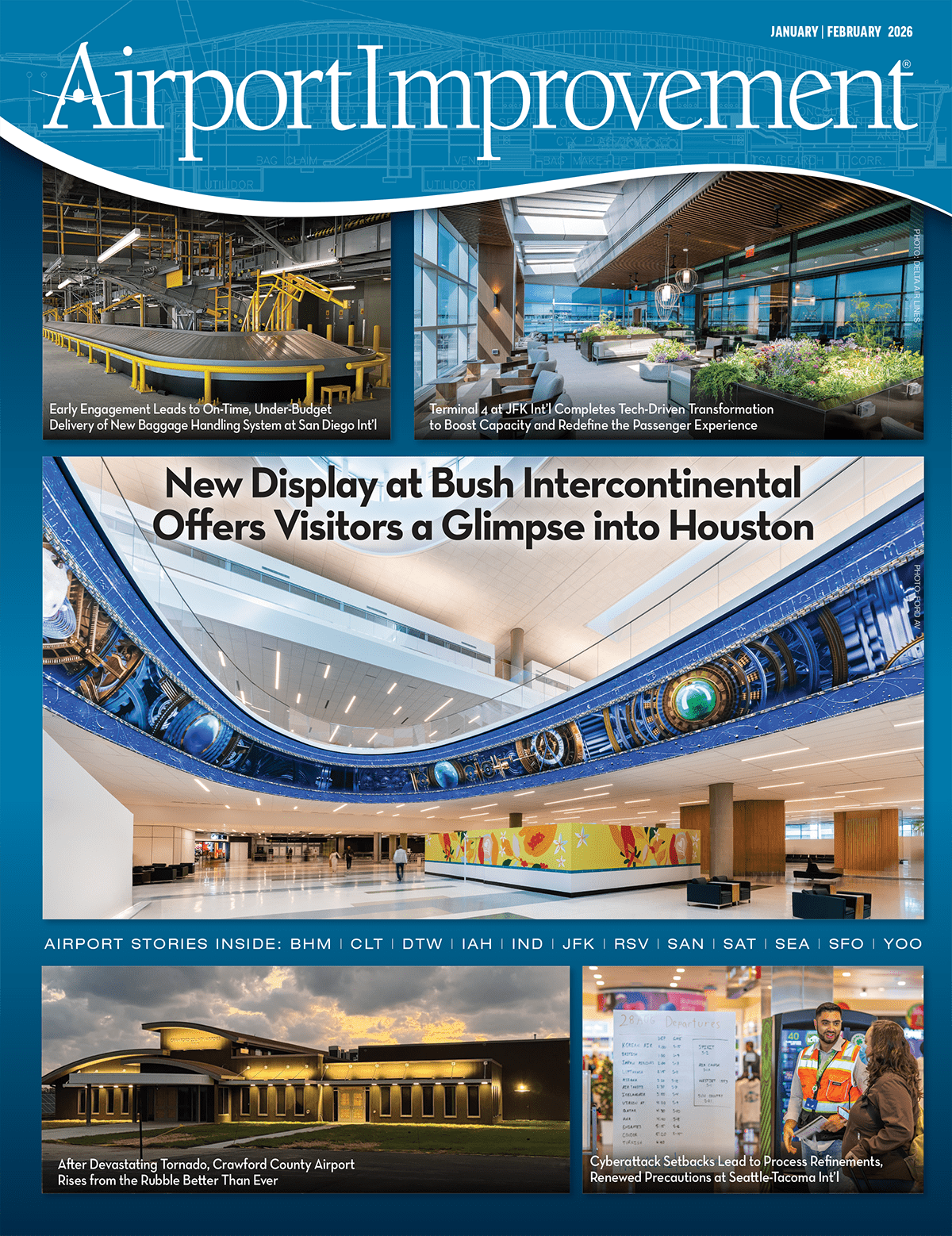 Earlier this fall, Lehigh-Northampton Airport Authority turned over management of Lehigh Valley International Airport (ABE) to a private operator for at least two years. The move to outsource its top job followed a period of
Earlier this fall, Lehigh-Northampton Airport Authority turned over management of Lehigh Valley International Airport (ABE) to a private operator for at least two years. The move to outsource its top job followed a period of
|
factsfigures Project: Outsourcing Airport Management Location: Lehigh Valley (PA) Int’l Airport Owner/Operator: Lehigh-Northampton Airport Authority Sister Airports: Queen City Airport & Braden Airport Private Management Firm: AvPORTS Initial Contract: 2 yrs Est. Fee: $300,000, plus travel expenses & reimbursement for salary of its airport director designee Rationale: Management firm can provide broader set of expertise & experience than any single applicant for the position Benefits: Provide stability after two recent changes in leadership |
In February, ABE’s interim executive director, Larry Krauter, announced he was leaving to head Spokane International Airport in Washington. Krauter, who filled the position since August 2010, had been an airport fixture for 21 years and was considered by some to be on track to become the next permanent director.
Months earlier, George Doughty, who served as executive director of the airport authority since 1992, resigned after the authority made it known that it sought change. The authority’s 17-member board of governors wanted to revamp the business processes of the authority and reposition the airport. Marketing efforts were launched to attract new carriers and expand capacity from existing airlines.
According to airport traffic reports, the efforts paid off. In January, passenger traffic at ABE totaled 61,490 passengers – a nearly 12% increase compared to the same time period the previous year. Passenger volume, in fact, had increased steadily from July 2009 to August 2011, when it took a 4% dip compared to the previous year, seemingly due to Allegiant Air ending its seasonal service to ABE from Myrtle Beach, SC earlier than usual.
At the same time, the airport authority was contending with a legal matter involving 632 acres of land that the airport had a court order to condemn in 1998. Putting an end to the long-standing debate, a Leigh County judge ordered the airport authority to pay the former property owners $26 million, of which $16 million remains to be paid.
Whoever would be selected as the next executive director would not have an easy job.
As the airport authority explored its options, Skip Fairchild, the airport’s director of public safety since 2002, was given the added responsibilities and title of acting executive director.
Traditionally, the airport has had one manager lead the airport’s initiatives. Without an executive director, however, the board found itself becoming more involved in the hands-on management of the airport, which was not the board’s intent, explains authority vice chairman Anthony Iannelli.
“From my perspective,” says Iannelli, “we want to get back to professionals driving and managing initiatives rather than managing by committee.”
Departing from tradition, the authority selected a private management entity, AvPORTS, for the job. AvPORTS will be accountable for managing the airport’s operations for two years, with an option, at the airport authority’s discretion, for a third year. AvPORTS will reportly receive a fee of about $300,000, plus related travel costs. It will also be reimbursed for the salary of its designee, former FAA National Planning and Environmental Division manager Charles Everett Jr., who will serve as the director of ABE and its sister airports (Queen City Airport in Allentown and Braden Airpark in Forks Township) under a temporary contract.

“The feeling was that a management entity might bring to the table a knowledge base that a single person brought on as the executive director would not,” Iannelli explains.
But the decision was not an easy one, he notes. The board reviewed more than a dozen applications from individuals seeking the position.
While 22 companies responded to the airport authority’s search for a management firm, only AvPORTS officially bid for the position. It eventually emerged as the near-unanimous bid winner, with only one board member not in favor of contracting AvPORTS or any outside firm.
winner, with only one board member not in favor of contracting AvPORTS or any outside firm.
Although the airport authority did not receive a high quantity of submissions from management firms or individual applicants, says Iannelli, it did have quality.
Winning the Bid
Iannelli points to AvPORTS’ 84 years of experience and its breadth of aviation industry knowledge as examples of such quality. AvPORTS currently provides management-, development- and infrastructure-related services to 14 entities at 17 locations. Its clients include large and small hub airports, relievers, general aviation airports, heliports, passenger terminals, fixed base operations, and ground service equipment and air cargo facilities. Its portfolio includes nine FAA-certified airports.
“We have seen a lot more than one person could possibly have seen,” says AvPORTS president and CEO Ozzie Moore, himself a 30+-year industry veteran. “We know what works and what doesn’t.”
The company was born in the Airport Division of Pan Am World Services, a wholly owned subsidiary of Pan American World Airways. As a pioneer in international commercial service, Pan Am often explored markets without airports or professional resources to manage its flights. What Pan Am needed, it had to develop, explains Moore.
The company then changed ownership a number of times. “Each is important because it allowed us to learn and gain new skills that today allow us to claim and credibly demonstrate  that we are a full-service airport management provider,” says Moore.
that we are a full-service airport management provider,” says Moore.
After Pan Am came Johnson Controls World Services, which developed and deployed complex building management systems that helped the company better understand the intricacies of integrated facilities management. Subsequent affiliations with American Port Services and Macquarie Bank brought AvPORTS important new competencies in entrepreneurship and financial engineering.
Since 2009, AvPORTS has been affiliated with AFCO (Aviation Facilities Company), a developer and manager of airport infrastructure facilities. As such, the company’s vision and overarching objective have expanded significantly, allowing it to offer a broad menu of airport services with single-point accountability.
The AvPORT Approach
AvPORT hit the ground at ABE in September to perform a 90-day evaluation. As Moore describes it, team members surveyed what resources the airport has, where it wants to go, and how it will get from here to there.
At its various locations, AvPORTS encourages employees to develop areas of excellence based on a unique skill or a unique situation they need to overcome (noise pollution, for example), says Moore. These centers of excellence become sources of innovation, creativity and energy, he adds. Experts from centers of excellence at other locations are being imported to ABE and its sister airports to help evaluate the situation.
“We will not be reinventing the wheel when we find something that is working,” Moore specifies, while embracing the corollary as well: “We also learn every time we go to a new location.”
Airport press releases highlight some of the airport’s achievements throughout the years: In 2008, Allegiant Air recognized ABE as the airport with the “Highest Passenger Growth.” In 2004, airport authority employees were honored for saving a passenger’s life with CPR and an automated external defibrillator. In 2001, ABE was one of the nation’s first commercial airports to offer an airport website compatible with mobile devices.
In November 2010, the airport authority celebrated the completion of Phase 1 renovations, which included the complete renovation of 17,000 square feet of the main terminal building and the addition of 6,500 square feet to provide a more functional operating space. Other work included the construction of new airline ticket counters and back offices, and new space for news/gift shops and restaurants.
Clearly, there are things the airport has done right, says Moore. Conversely, AvPORTS is sure there are some things that could be improved.
“We need to look at what is the right niche for ABE and why,” he explains. “Who lives in this area? Where do they work? What kind of businesses are here? Where do business transactions take place? What do all those resident businesses and people need from an airport? We want to get our arms around all of those questions, then identify where and how people travel, which airport(s) they use and why, and ensure they understand the tremendous advantages of using this gem of an airport close by.”
AvPORTS will work with the airport’s major stakeholders to find that niche, test it and further refine it, stresses Moore. What it doesn’t want to do is give the impression that AvPORTS can do it all by itself, he adds. “We are not the only ones at the airport,” Moore emphasizes. “It’s a total effort. We need to figure out ways to get everyone at the airport working on the same page, toward the same objective.”
Toward that end, AvPORTS will apply its Total Effort Airport Management culture – dubbed TEAMSM. The approach, notes Moore, has netted AvPORTS a perfect record of 100% contract renewals. The method combines a group effort with individual ownership and responsibility for tasks performed, he describes.
Once the team identifies a sustainable niche, Moore says, “We need to figure out how to get from where we are with the skills we have to where we know we need to be.”
Having developed an action plan, AvPORTS will work to get buy-in from the board, as well as the stakeholders. Because the plan would have been developed in concert with them, the stakeholders will already know what the plan intends to accomplish, relates Moore.

In addition to signing off on the strategic plan of action, the airport authority retains policy direction and ultimate decision-making authority. Any major changes, including rates, require approval from the authority.
Given the go-ahead, AvPORTS will “aggressively implement the action plan,” says Moore. “We want to reorient the airport and its operations and be well on the way to accomplishing the airport’s sustainable niche strategy.”
A long-term reorientation will not happen in two years, he specifies. “Our goal is to put them on the path to what they need to accomplish.”
Moore likens outsourcing to an inoculation that protects an airport from people accusing it of being inefficient. “You could argue that the outsourcing process produces the best the market has to offer at the time,” he says.
Outsourcing also holds an outside entity accountable for what is or is not being accomplished, he adds. AvPORTS’ two-year contract, for instance, includes incentives to encourage the company to get as much done as possible. Additional incentives may be established for increased passenger traffic, new airlines and/or cost savings.
In addition, Moore notes, outsourcing helps remove some of the red tape that public sectors may encounter.
Broader Outsourcing Given the challenging current economic climate, AvPORTS president and CEO Ozzie Moore predicts that outsourcing of a broader nature will become more common throughout the airport industry. “There is not enough money in the public sector to do all that needs to be done,” he says, citing development, security and maintenance as a few examples. In longer-term relationships, private entities can share risk with public entities that cannot afford to make much-needed improvements, he explains. As such, Moore anticipates seeing more bid solicitations for private entities that can finance, build, develop and operate public facilities. He cautions, however, that outsourcing to multiple, overlapping entities can create conflict. “Each one can point to the other as to why a job was not done well,” he explains, making a case for company (like AvPORTS) that can provide multiple services and a single point of accountability.
Revenue vs. Expenses
Outsourcing, however, also includes inherent challenges. Often, employees fear that an outsourcing company is “out to get them.” Bringing in a private third-party, which possibly uncovers new efficiencies, can result in “surplus employees.” If that proves to be the case at ABE, Moore says, AvPORTS will first look to re-deploy such employees into new revenue-generating activities.
The bottom line is improved not only by managing expenses, he notes, but also by growing sustainable revenues. AvPORTS looks at both, he emphasizes.
“We do not come in with a cutting mentality,” he relates. “We are constantly looking for revenue opportunities, because cutting employees generates an environment that can constrain creativity.” The successful exploitation of a newly defined niche sometimes requires retraining for existing employees, he adds.
Moore sees significant pluses at ABE: The Pennsylvania airport is well-located near Allentown, Bethlehem and Easton – thus it’s “ABE” identifier – and it’s easily accessible from northern New Jersey. The 12-county area it serves has a population base of 3.6 million people, and it’s an inexpensive place to attain high-quality living, he notes. In addition, the area has major companies, festivals, history and tourism. The airport itself is easier and less expensive to access than other nearby options, he adds, noting its competitive parking rates and quick check-in-to-enplaning times. The quality of service also is much better than larger airports in the area, he says.
“We’ve been looking at all of those things, and to all the improvements that might still be possible to accomplish with any and all of them,” Moore summarizes.
AvPORTS has also been attuned to what airport employees are thinking – especially given their two recent leadership changes. “One of the things we want to do is bring some stability, along with predictability,” he says.
That’s what the airport authority is looking for as well. Failure is simply not an option, notes Iannelli. “We want to improve traffic and provide a quality airport for our community,” he relates. “We want to have an airport that the community and board can be proud of.”
In a word, the airport authority is looking for a win. To get that win, Iannelli says it is “optimistic and focused.”


